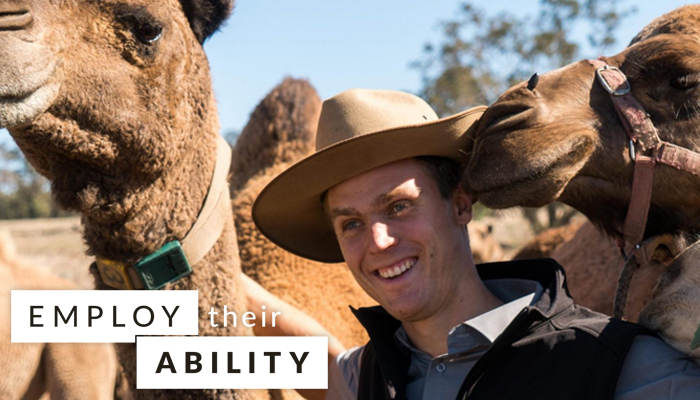Max Bergmann
Max Bergmann with his camels at their camel farm in Morangup, Western Australia (Source: Drome Dairy)
Max transforms his vision into reality
When Dr Max Bergmann aspired to follow his childhood passion for farming, many suggested otherwise due to his eye condition. “I never listen to such advice,” says the legally blind Paralympian with a PhD in Plant Physiology.
In 2015 Max launched DromeDairy Body + Skin, an ethically-run camel dairy farm on the outskirts of Perth in Western Australia that manufactures body and skincare products.
Diagnosed with retinitis pigmentosa at the age of eight meant Max’s ability to see declined slowly and progressively. He shares, “I have my peripheral vision but a blind spot in the centre of my eye”.
Being legally blind, however, in no way stopped him from pursuing his goals.
After coming across a documentary on camels and researching the benefits of camel milk, Max and his wife Ronja, a forensic chemist, decided to set up a sustainable farm to protect the region’s dromedary population and develop natural products to share those benefits with many others.
“Unfortunately, there’s a bit of a bad reputation with camels, and millions are spent to cull these beautiful animals. The reality is they are affectionate and intelligent, and how you treat them is critical,” he explains.
Max undertakes a range of activities on the farm. From training, feeding and milking camels to maintaining acres of feed crops, and upkeep of farm infrastructure to marketing products. As a physically intensive industry, farming has its risks. These challenges increased due to Max’s eye condition.
“Farming is a very visual enterprise and you learn the environment over time,” says Max. “Using peripherical vision to drive a farm tractor is difficult. I would run into fences, which would mean additional costs and time to do the job. Steering the tractor up and down the paddock in parallel lines was also hard, leading to loss of resources,” he adds. Relying on peripheral vision would cause Max to strain, resulting in sore eyes and headaches.
Max realised he needed a solution to utilise his skills better and reap long term business benefits. He remembered learning about workplace modifications organised by JobAccess from a Disability Employment Services (DES) provider when he was searching for paid work.
“I kept that in mind, and thought I had to apply,” he shares.
Max lodged an online application for the Employment Assistance Fund (EAF) to secure funding support for modifications. “I had to prove my eligibility as a self-employed worker and the rest of the application process was straightforward.”
Through the EAF, JobAccess arranged for a vision assessor to visit Max at the dairy farm to conduct a free workplace assessment. The assessor recommended a range of equipment and supports to help Max become self-reliant in performing his day to day tasks.
“The turnaround time was exceptionally good. I had confirmation from JobAccess on my request for equipment within 24 to 48 hours.”
One of the equipment included a GPS auto-steering control system for the tractor to navigate the farm. “I’m now able to use the GPS to drive up and down the paddock for seeding and cropping. It’s very precise, and I can highlight any obstacles with the click of a button,” says Max.
The funding enabled the installation of corflute cards that function as landmark markers and provide orientation cues.
The assessor also recommended the use of KNFB Reader to help Max easily access the content of printed materials, in addition to installing Seeing AI, a free app that converts visual data into audio feedback.
“The app transfers text to speech and gives me the independence I need to do the job. The best part is I don't need to ask for help,” Max explains. “I am now able to do my work and manage the business.”
Simple modifications through JobAccess helped Max gain the self-sufficiency to focus on his farming enterprise and pursue his vision to build an important industry that can save Australia's camels.
JobAccess works with a national panel of assessors to conduct free workplace assessments and advice on workplace modifications and support. Such modifications may be eligible for reimbursement through the Australian Government’s Employment Assistance Fund (EAF). Contact JobAccess on 1800 464 800 to learn more about workplace modifications.
Last updated:

